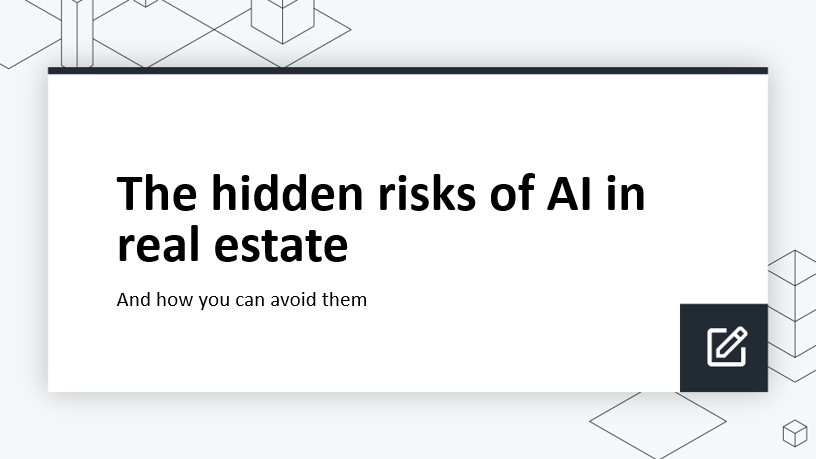Property descriptions can be drafted in seconds, valuations can be generated instantly, and tenant applications can be sorted without lifting a finger. The temptation to save significant time and lean on these tools is understandable. But what happens when technology makes a call you cannot easily explain, or can’t explain at all?
For agents, it’s not just frustrating; it could put their agency and their reputation at risk.
This is where real danger lies. If you cannot justify a decision to your clients, then using AI within your agency begins to become a liability rather than an advantage.
Picture this: As an agent, you want to create extra time by outsourcing tasks that consume a large part of your day. You’ve decided that writing property descriptions is something that you can get AI to handle for you. You test it out by getting it to generate a property description for a recent listing you’ve got. You give it a skim; it looks like it’s formatted correctly, and you make it live. Enquiries start pouring in asking about the proximity to the local school mentioned in the description. You re-read what AI has written, only to discover that it has included a school in the catchment that is actually nowhere near this house. You’re then faced with going back to the potential client, apologising & correcting yourself, before you’ve even had a chance to show them the property.
If you cannot explain how AI made a decision, how can you trust it with your agency?
Why is AI reshaping the industry
More time back in your pocket
Across the UK, more agents are looking to experiment with AI tools to speed up valuations, create property descriptions and even vet tenants. The promise is huge, but many in the industry are still working out what is ‘true AI’ and what is just basic automation dressed up as something more.
The adoption curve is steep because the real estate market is under significant pressure, and agents are naturally looking for ways in which they can work smarter, get back time in their day, and close deals quicker than their competitors.
Is it really AI, or is it just automation?
It is easy to be swept up in the hype, but without a clear understanding of what these systems actually do, agencies risk adopting tools that add complexity instead of clarity. Before adopting AI in your agency, it’s important to note and understand the differences between genuine artificial intelligence and what is simply automation. A great place to start with this process is to write down the tasks that you ideally would like AI to help your agency complete more efficiently.
AI offers an appealing promise, of less time spent on repetitive tasks and more time with clients. However, there is a clear gap between the hype and a full understanding of what these systems can and cannot do. With new AI platforms entering the market continuously, often these tools are labelled as AI but are simply automation packaged to look like artificial intelligence.
For example, do you need help reducing the number of hours it takes for your agents to write property descriptions and outreach emails? Or is it a larger priority for your agency to do something along the lines of needing automated reminders to send emails or complete follow-up calls? This will give you the answer you need. The first problem can be solved by AI, the second can be solved with automation.
Understand your agencies pain points
Understanding where your agency's pain points are vs what tools you realistically need is key. Real AI is far more complex than automation, and while it can bring your agency relief and transformation, it also can bring with it more concerns you have to consider such as data privacy and security.
At Reapit, we believe it’s vital to recognise both the opportunity and the responsibility that comes with adopting AI. That’s why we’re developing Reapit AI (RAI), our own Platform AI feature launching in 2026. Platform AI is an intelligence layer embedded deeply within the Reapit ecosystem, powered by your agency’s own data and governed by enterprise-grade security and controls. Unlike general-purpose models, RAI will adapt to your business, your brand voice, and your workflows, working with your data, not around it.
The risks of hiding in plain sight
‘Black Box’ Decisions
The biggest risk is not only that AI gets something wrong, it is that you often do not know how or why it reached its conclusion. From compliance pitfalls to data misuse and reputational damage, hidden risks can mount quickly if agents do not keep control.
When a valuation, listing description, or tenant recommendation cannot be explained, it raises questions of trust. For clients, that lack of transparency can be a deal breaker between deciding to go with you or a competing agency.
AI tools can generate outputs that agents can’t justify or trace, and if an agent can’t justify these decisions, the accountability falls back on them.
Legal and Compliance Exposure
UK laws such as the Data Use and Access Act 2025 and existing consumer protection regulations require businesses, including estate and letting agencies, to disclose when AI is used in decision-making. According to global law firm Freshfields, the law gives individuals “rights to make representations, obtain human review, and contest significant decisions”. In the property sector, this could include tenant applications, vendor enquiries, maintenance requests, and more.
In addition, misleading property descriptions, altered images, or automated valuations without oversight could breach the Digital Markets, Competition, and Consumers Act 2024.
When an agent uses an AI tool that hallucinates property details and features, gives a false valuation compared to market value, and produces information that can’t be audited or confirmed externally, this puts them at risk of breaking the law.
If an agent is found guilty they don’t just risk fines, but also significant and reputational damage.
Data Security Concerns
When using AI platforms, the answers that they give you in return to the prompts you provide are often trained on millions of sets of data available to the platform, often provided by other users. This allows the platform to give you an answer that is in line with that you’re expecting as it’s learned how to behave and respond by viewing huge datasets.
If those systems are not properly secure, there is a huge risk of client and agency data being misused or leaked, and with the real estate sector relying heavily on trust, a data breach of your client's data can cause enormous damage to both clients and agencies.
This is why we’re excited for the launch of RAI, Reapit’s own Platform AI feature. RAI is embedded directly within the Reapit platform, powered by your agency’s own data, and protected by enterprise-grade security. Unlike general-purpose AI tools, RAI learns from your existing Reapit data to understand your business, your brand, and your workflows, delivering intelligence that works with your agency, not around it.
Real world examples to relate to
In Australia, an agency used ChatGPT to write a listing, falsely claiming proximity to non-existent schools.
In the UK, a case of AI-rendered property photos which removed the beauty parlor next door and added in fake furniture, prompted Sam Richardson, Deputy Editor of Consumer Magazine Which? Money to say to comment that “Finding the right home to buy or rent can be tricky enough without having to worry about AI or edited images. With home buyers and renters likely needing to view several properties, this could waste their time and money travelling to viewings of properties that look nothing like they do online.”
How to avoid these risks
The good news is that agents are not powerless. By insisting on AI tools that explain their decisions, keeping human oversight in place and choosing partners who built in compliance and data security, agencies can gain the benefits of AI, without the hidden headaches.
Explainability
Picture this: You use AI to write a property description as you’re running short on time and are on the go. You skim read and hit post. But something is inaccurate, and a potential buyer questions this.
If you’ve used an AI platform that provides a clear audit trail of how decisions are made, you’re able to go back to your prospect and provide reasoning as to why that was written. Your aim should be to use tools in your agency that provide visibility over the data produced and reasoning behind it. Without explainability, the risks outweigh the benefits when using AI.
Stay compliant
When using or publishing information that has been generated by AI, you have to make sure that it can hold up if required, under UK laws. Agents should review all AI generated content against relevant consumer protection regulations. To help combat this, ensuring that you have processes in place to double check and verify what AI produces before sharing it with clients is key. This can look like having two people review each piece of content generated by AI before it goes live as a safeguard to picking up any errors it may have produced.
Protect Data
We touched on this earlier, the importance of using suppliers who prioritises data security. Client information is sensitive, and there absolutely must be clarity about how it is stored, processed, where it is shared, who else has access to it and how it is protected. If the platform you’re using can’t provide this, it might be worth finding an alternative supplier. Reapit’s AI for example, is built with compliance and security as core principles, ensuring agents can trust that their data is safe while using our platform.
Don’t remove human oversight
The number one thing to remember while implementing AI into your agency is that it’s recommended that AI shouldn’t replace human judgement. It is a tool designed to assist agents by taking on repetitive or easily generated tasks, while leaving the big decision making and accountability tasks with a human. Keeping human oversight alongside using AI ensures that errors are caught earlier; context is applied to the content you’ve generated, and that compliance is maintained. AI works best as a partner, not a substitute.
A future defined by trust
At Reapit, we believe AI should empower agents while maintaining trust and control. That’s why we’re building RAI, our Platform AI feature, with transparency and security at its core. RAI is powered by your agency’s own data already housed within the Reapit platform, not by generic internet sources, ensuring every insight is relevant, reliable, and tailored to your business.
We understand that every agency works differently, so our approach is flexible enough to fit unique workflows while providing confidence that what you’re using is accurate, secure, and aligned with data regulations.
Conclusion
AI is here to stay in real estate, but the difference between success and failure comes down to trust. With the right software, AI becomes more than a buzzword. It becomes a reliable tool that helps agents protect their reputation, deliver better service, and grow with confidence.
The difference between agencies that succeed in using AI will come down to trust and security.
The hidden risks of AI in real estate are only hidden if they remain overlooked. AIs making ‘black box’ decisions, compliance pitfalls and data misuse are not future responsibilities. They are current realities. Agents that actively work to address these while using AI will avoid these problems and position themselves as leaders in a market that is changing rapidly in the UK.
Don’t put your agency’s reputation in the hands of unreliable AI tech. Instead, use tools like RAI that are transparent, compliant, secure, and built specifically for estate agents.
.svg)









